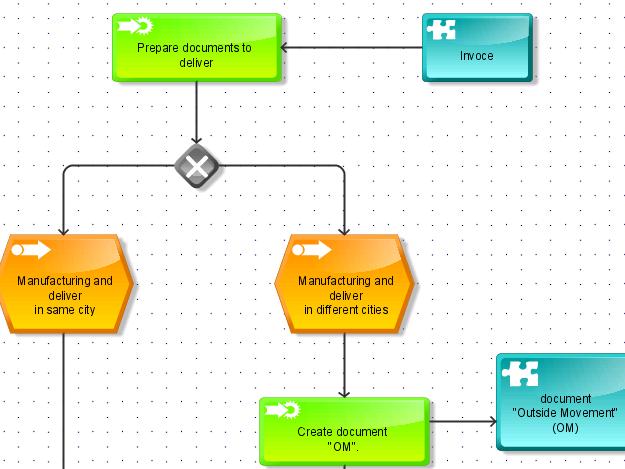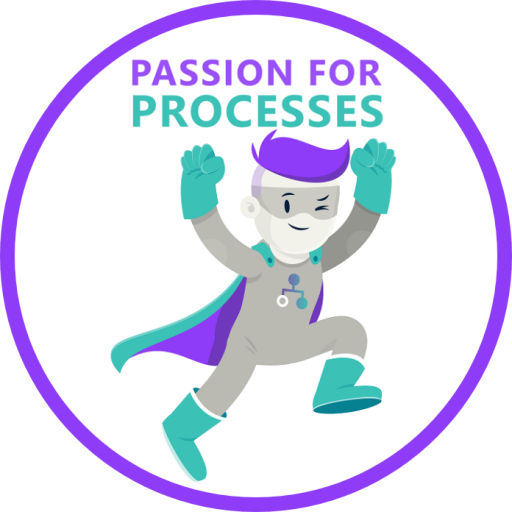
I have started today hot discussion with my colleague about simple diagram of one simple business process in our company. We together have just started to learn aris and BPMN at all. So I need to ask aris community to resolve this simple, but very important for me and my colleague, issue. Till this time we haven’t got mutual opinion on this issue :)
The essential discussion is above the first green rectangle and following separated ways (look at diagrams).
So…
I’ve introduced two diagrams. One of them is mine, another is my colleague’s diagram. Please, make your choice where is correct diagram or say me that these two diagrams are wrong. Let's discuss them.
I’ve inserted images of these diagrams ("varian-M" and "variant-H") inside this article but I don’t know how to place here *.adf-file, therefore I’ve placed *.adf-files on my site in internet: http://mypa.zzl.org/bp_ihbst/ . If you wish to edit diagrams by ArisExpress you should download ZIP-file from my site.
Variant - M:
Variant - H:
Hi Henry,
well, modeling a Business Process is a bit more flexible than modeling a BPMN model. Actually, for a Business process (or EPC), both a valid, I think.
OK, here is my opinion:
1.) In variant "H", I miss the "start event", that point goes to variant "M"
2.) But concerning the way, the events after the decision are name, I would go for variant "H".
Bye,
Frank
In variant-H we hide “making decision”. In variant-H we make decision to choice one of existing ways but we don’t paint it on diagram.
In variant-M we paint “making decision”. In variant-M we make decision to choice one of existing ways and we paint this action (rectangle “Define, where were…”).
So is it permitted (in EPC) to hide action of decision making?
Henry, hi
I agree with Frank, both variants are valid.
I had such kind of situation, then 2 questions helped me to choose whether the "making decision" step shall be shown :
- if the executor and decision maker are different persons,
- if the "decision making" step is very important for this process
Oksana
Thank you, Frank, and thank you, Oksana, very much.
I have supposition, I'll try to prolong your thought, Oksana...
if I have to make important decision or I want to write some notes about decision making before fork, I should draw green rectangle "decision making action". So I'll have possibility to explain decision making in notes or in descriptions for diagram.
I think, while I'm novice at Aris I'll draw "decision making" before any fork :)
But perhaps, someone has other point of view? People, don't hesitate, write your variants.
Hi Henry,
when I checked variant H, I asked me, where the split decision is based on. This variant does not answer my question explicit. In so far, I would prefere variant M.
Maybe it would be helpful to clarify the decision criteria by an additional object in the model - to support lay recipients reading the model.
Actually, variant-M is my position. But as I’m novice at designing of business processes I want to know opinions a lot of people, cause, in future I’ll design bp for persons with various knowledge levels in EPC (BPMN, etc.). Therefore I have to know a perception of any person to find the best and clear approach to explain my thought on diagram for any kind of people.
By the way, I consider, EPC is the best way to explain for somebody own thoughts about bp on diagram. So AE is amazing tool as for me.
Thank you, Mr.Lengert.
Does someone have opposite opinion? Please, say it. I need to know.
I think it is generally better to make the decision explicit. One of the points of creating the process model is to communicate to people so that they know what happens in the process. Being explicit helps with the communication.
If you are going to have criteria I would also add that it is worth thinking about how likely it is for the decision outcomes to change and how quickly the business needs to respond to the change. If the business wants the ability to change the outcomes and there is business value in doing it quickly then the decision should be explicit and is a lilkely candidate for being implemented as a Business Rule.
Rick
hi henry , i suggest
- this useful guideline. Seven Process Modeling Guidelines (7PMG) (you can find easiley via google)
- test your process models
- Like Fritz i suggest in H you to add step before first xor (eg Where Manufacturing and deliver are made?) and after same step
- Never mix decisions activities and others types in the same activity : if not decomposition/refactoring will be more difficult
regards
Yeah, there are good a set of words in item #4. I like it :)
Thank you for reference. I’ve downloaded and read 7PMG. There are useful advices in this document. I’m glad that my logic has known a part of these rules before receipt of this document :) So I want to confirm my similar position.
But now I have one thought… one opposite thought…
If you read expression of Oksana Sklamina (look upper in this discussion) you will understand why I want to make next guess…
I feel that sometimes we can draw diagram without “decision making” action. I agree this is abnormal rule. But I think, people do it, because they know and understand all refinements of designed business process. In case I work with one partner and we understand together just after silent sight (understand hints), we can use this abnormal rule.
But I don’t want to imagine how we (me and my partner) explain this abnormal diagram when we’ll start discussion with colleagues which will take a part in this project on other stages.
So, my private conclusion, every time we should use “decision making” action before fork. In same manner we have possibility to point any factors which have influenced on decision.
Why I said “my private conclusion”? Because there are still a lot of other opinions :)
Dear All,
Hi everyone. I'm not going to develop this discussion further, because I think we have lots of professional here who replied Henry's Question very well. All I need is just your opinions about my point here. As those picture of Henry shows and I hope to get the point truly, there is 4 possibility for prepared documents like these:
1. Item Manufactured in This City, Delivered in This City (Same City)
2. Item Manufactured in This City , Delivered in Other City (Different City)
3. Item Manufactured in Other City, Delivered in This City (Different City)
4. Item Manufactured in Other City, Delivered in Other City (Same City)
Here I mapped a Business Process that covers only the # 1, 2, 4 status above (pretend there is no possibility to deliver a Manufactured Item from Other City to This City i.e #3).
you may also want to download it here:
https://sites.google.com/site/thebalancedscorecard/
I tried to draw this BP properly but if there any fracture there please send your notes and also tell me how can I complete it to cover status #3 simultaneously.
Regards to All.


















